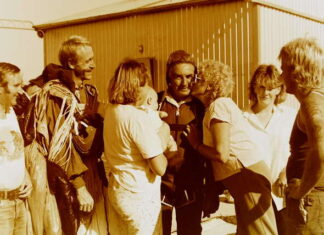By Melissa Grant
BEFORE Sam Cawthorn died, the last thing he remembered was seeing a dozen people standing around his crumpled car gazing at him helplessly as if to say he wouldn’t make it.
As the sirens wailed, Sam slipped away. He died another five times during his 20-minute ambulance ride to emergency.
Amazingly, Sam lived to tell the tale – and despite losing his right arm and being told he would never walk again, he said he wouldn’t change a thing.
“We can plan for our lives this way, but life circumstances take us a different way,” the inspirational speaker told Pakenham secondary students on Thursday.
“Problems define your character and who you are.”
Sam’s story struck a chord with Year 10 students at the college who were asked to voluntarily sign a no dole charter.
Before Sam told his life story, about 80 per cent of students had signed the charter. Afterwards, the remaining 20 per cent also pledged to be in full-time education, training or employment by the end of March.
“Anything is possible if you believe,” Sam told those who had gathered for the students’ ‘No Dole’ charter signing ceremony.
The ceremony was an important part of the school’s No Dole program, an initiative of the Beacon Foundation which has been supported by dozens of Pakenham businesses.
As guest speaker at the charter signing, Sam’s job was to inspire the students to follow their dreams, to make them believe that anything was possible.
The 2009 Young Australian of the Year for Tasmania, who is best remembered for his meet and greet with Prime Minister Kevin Rudd who literally shook his right hand off, has a remarkable story to tell.
The father of three is now a highly sought after communicator who has spoken on four continents to more than 70,000 people.
Sam’s address began light-heartedly, as he spoke about growing up in country Tasmania as one of 11 children to strict and culturally diverse parents – an Indian mother and Scottish father.
The 29-year-old from Launceston amused the audience with stories about his three girlfriends, including his first, Belinda Brownhill.
Sam recalled the joy of kissing the five-year-old behind a tree, despite his mother’s disapproval.
“She came over screaming, pulled down my pants and smacked my bum,” Sam remembered.
Sam’s address to the students took a serious turn, although he still managed to keep the audience amused, when he spoke about the car crash that dramatically changed his life three years ago.
The car Sam was driving veered into the path of a semi-trailer on Tasmania’s Bass Highway, as both vehicles travelled at about 100km/h.
The impact, which police estimated to have been about 206km/h, saw the steering wheel in Sam’s car end up underneath the dashboard.
The head-on collision left him with six broken ribs, two collapsed lungs and a busted right arm which was later amputated below the elbow. Sam also lost all of his blood twice over and had several breaks in his right leg which is now kept together with two rods, four plates and 21 bolts.
Doctors told Sam he would never walk again. He was hospitalised for five months and in a wheelchair for nine months before he began a gruelling course of rehabilitation.
But if you ask Sam if he would change anything about the day he died, he will reply with an emphatic no.
Without that experience, Sam says he wouldn’t be doing what he is so passionate about today. And besides, as he emphasised to the Year 10 students, there is no point dwelling on the past.
Life is about making the most of your opportunities and having an open mind about the future.
“The future is there to be created, so run your race,” Sam told the students.
Sam tells of the day he died
Digital Edition
Subscribe
Get an all ACCESS PASS to the News and your Digital Edition with an online subscription
Looking back through the archives
50 years to 1976
Officer Princess, 16-year-old Sandra Burns, was selected as the first Queen of the Yakkerboo Festival. Although judging of the 13 Princesses...







